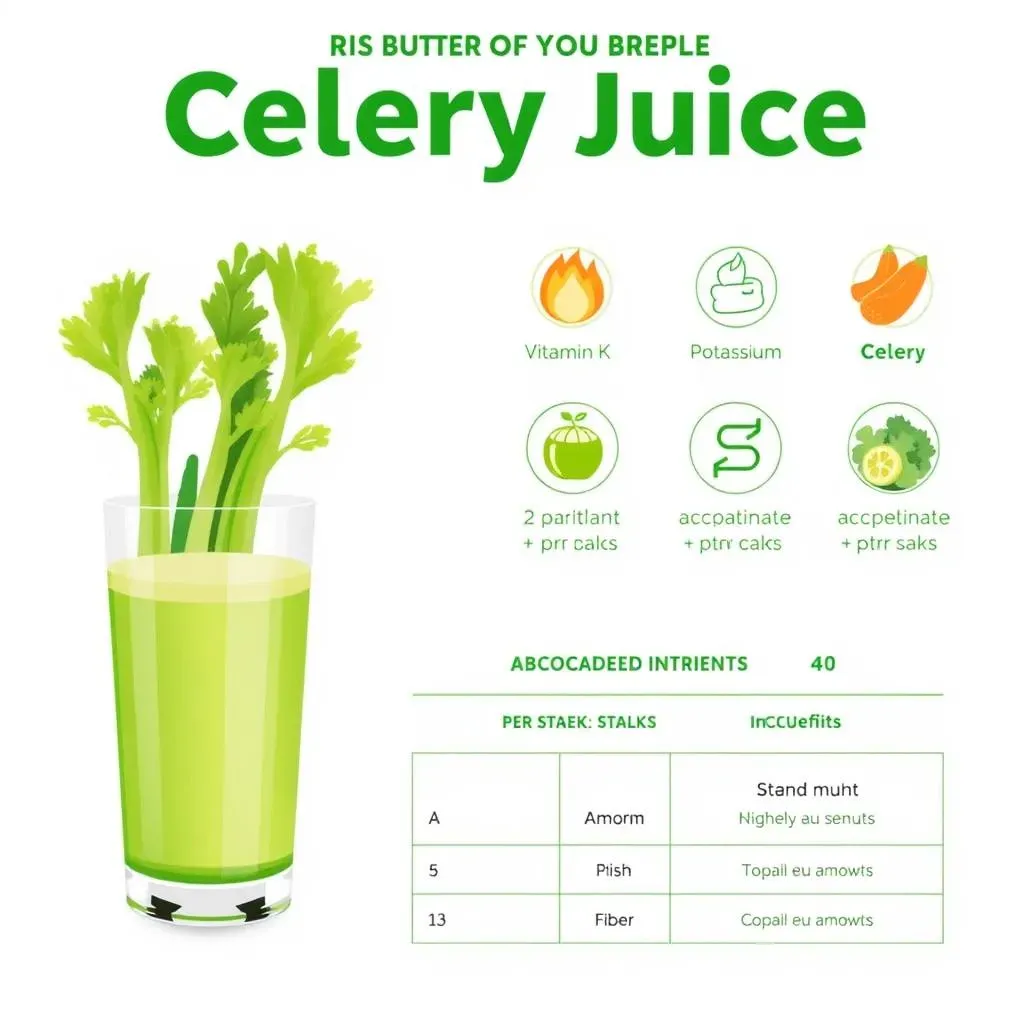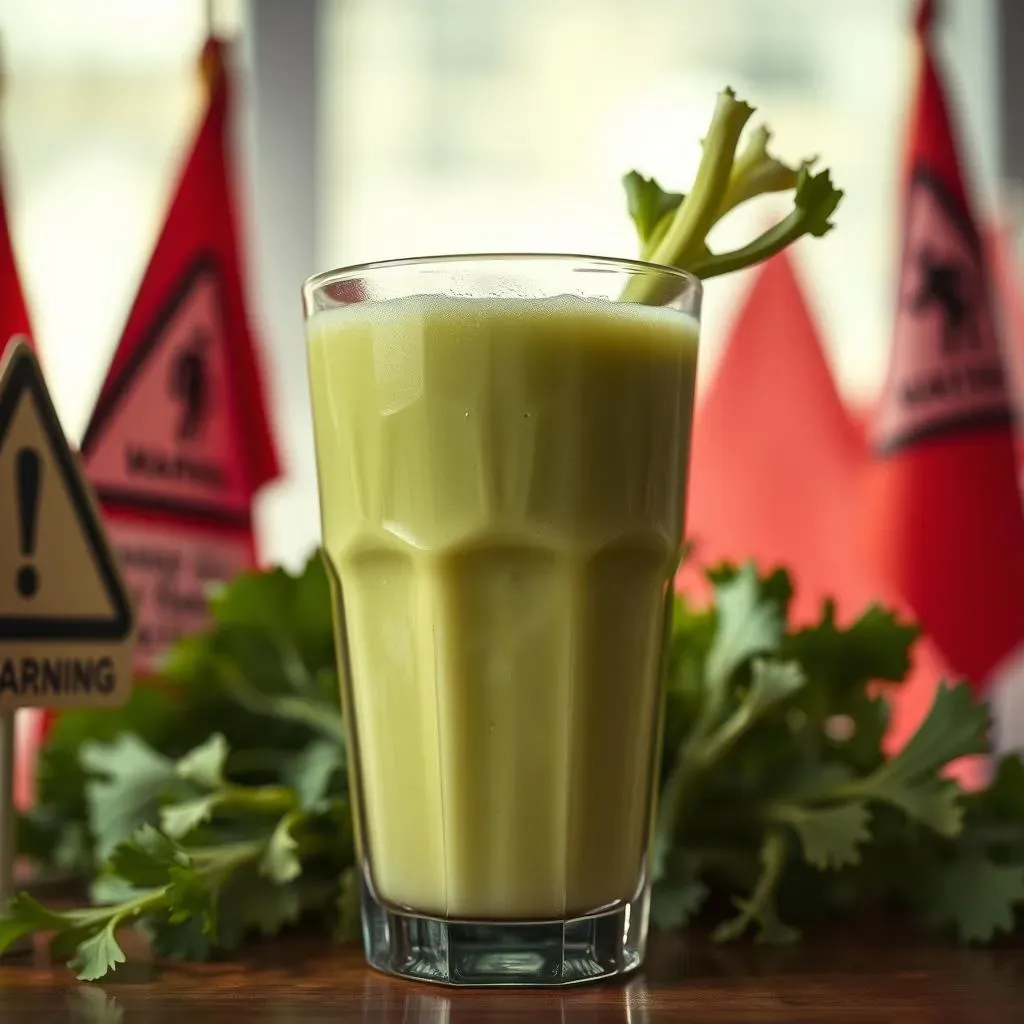Table of Contents
You've probably seen the hype: celery juice, the vibrant green elixir promising all sorts of health miracles. But before you jump on the bandwagon, let's talk about the real deal. Is it truly a detox powerhouse, or are there some hidden celery juice detox side effects you should know about? This article won't just echo the buzz; we're going to break down the science, or lack thereof, behind the claims. We'll explore what's actually in celery, how it changes when juiced, and the potential drawbacks you might face. We'll look into the difference between eating celery and drinking its juice, and tackle the question of those glowing testimonials. Forget the miracle cures, we'll focus on what's real. So, buckle up and let's get to the bottom of the celery juice craze, separating fact from fiction. We'll give you the info you need to make an informed choice about this popular drink.
Celery Juice: Nutrition Facts

Celery Juice: Nutrition Facts
What's Actually in Celery?
Okay, so you're curious about what makes celery tick, nutrition-wise. It's not exactly a powerhouse of calories, which might be why it's become a trendy diet snack. I mean, let's be honest, it's mostly water, like 95% water. But, don't let that fool you, it still holds some valuable stuff. We're talking about a decent dose of vitamin K, which is super important for blood clotting and bone health. Plus, you'll find some potassium, which helps keep your blood pressure in check. And let's not forget about the fiber, which is great for your digestion. Think of celery as a low-key nutrient delivery system, not a flashy superfood, but pretty solid.
Now, when you juice celery, you're essentially stripping away the fiber. That's a big deal, because fiber is what keeps you feeling full and helps your gut stay happy. What you're left with is mostly that water, plus the concentrated vitamins, minerals, and some phytochemicals. These phytochemicals are plant compounds that can have some interesting effects on your body, but we’ll get into that later. Juicing also concentrates the sugars naturally found in celery, which isn't necessarily a bad thing, but it's something to keep in mind. So, while celery isn't a nutritional rockstar on its own, it does have some valuable players on its team.
Celery's Key Nutrients
Nutrient | Amount per Stalk (approx. 40g) | Main Benefit |
|---|---|---|
Vitamin K | Approx. 15% of Daily Value | Blood Clotting, Bone Health |
Potassium | Approx. 100mg | Blood Pressure Regulation |
Fiber | Approx. 0.6g | Digestion, Satiety |
Water | Approx. 38g | Hydration |
Note: These values are approximate and can vary slightly.
Juicing vs. Eating Celery

Juicing vs. Eating Celery
The Fiber Factor
Alright, let's get real about the big difference between munching on a celery stick and chugging a glass of its juice. It's all about the fiber, my friend. When you eat celery, you're getting the full package – that crunchy, stringy stuff that keeps your digestive system humming along nicely. Fiber is like a tiny scrub brush for your gut, helping things move through smoothly and keeping you feeling full. It also helps regulate your blood sugar levels, preventing those crazy spikes and crashes. So, eating celery is like giving your body a good, steady fuel source.
But when you juice it, you're basically throwing away all that good fiber. Sure, you get the vitamins and minerals, but you're missing out on a major benefit. The juice is mostly water and those concentrated plant chemicals we talked about earlier. It's like taking the engine out of a car and just keeping the wheels; it might get you somewhere, but it's not the whole machine. You're losing the bulk that makes you feel satisfied, which is why you might find yourself feeling hungry again soon after drinking celery juice. It's a quick hit, but not a long-term solution.
Concentration and Satiety
Here's the thing: juicing celery concentrates everything. That means you're getting a bigger dose of the good stuff, like vitamins and minerals, but also a bigger dose of the not-so-good stuff, like those plant chemicals that can cause issues for some people. It's like turning up the volume on everything, including the potential side effects. And because the fiber is gone, your body absorbs the juice much faster. This can lead to a quicker spike in blood sugar, especially if you're drinking a large amount. It's the difference between a gentle wave and a tidal surge.
Eating celery, on the other hand, is a much slower process. The fiber slows down the absorption of nutrients, giving your body more time to process everything. It's like a slow-release capsule versus an instant injection. Plus, the chewing action and the bulk of the fiber help you feel full and satisfied. This is why a few sticks of celery can be a great snack between meals, while a glass of celery juice might leave you reaching for something else soon after. Think of it as a marathon versus a sprint, eating celery is the marathon, giving you sustained energy and satiety, while celery juice is the sprint, quick, but not very lasting.
Feature | Eating Celery | Drinking Celery Juice |
|---|---|---|
Fiber Content | High | Very Low |
Nutrient Absorption | Slow and Steady | Rapid |
Satiety | High | Low |
Concentration of Plant Chemicals | Lower | Higher |
Celery Juice Detox Side Effects

Celery Juice Detox Side Effects
The Potential Dark Side
Alright, so we've talked about the good stuff in celery, but now it's time to address the celery juice detox side effects. It's not all sunshine and green smoothies, unfortunately. Because celery is loaded with water, drinking a lot of juice can act like a diuretic, meaning it makes you pee more. This might lead to dehydration if you're not careful to replenish your fluids. And remember those concentrated plant chemicals? Some of them, like furanocoumarins and psoralens, can cause skin issues, especially if you're sensitive to them. Think rashes, itching, and increased sun sensitivity. It's like your skin is throwing a little tantrum because it's not happy.
Also, if you're on certain medications, like blood thinners, the high amount of vitamin K in celery juice can interfere with how they work. Vitamin K is important for blood clotting, and if you're taking something to prevent clots, suddenly flooding your system with more of it can be problematic. It's like trying to steer a ship with two conflicting rudders. And let's be honest, if you're drinking a ton of celery juice hoping for a "detox," you might actually be doing more harm than good. Your liver and kidneys are perfectly capable of handling detoxification, they don't need some green juice to do their job.
Digestive and Other Concerns
Then there's the digestive side of things. While some people claim celery juice helps with digestion, for others, it can cause the opposite. Drinking a lot of it can lead to stomach upset, bloating, and even diarrhea, especially if your body isn't used to such a large amount of liquid or if you have a sensitive gut. It's like your digestive system is saying, "Woah, slow down!" Plus, it's worth noting that some people are allergic to celery, and drinking the juice can trigger allergic reactions, which can range from mild to severe. So, if you're noticing any unusual symptoms after drinking celery juice, it's probably a good idea to stop and check with a doctor.
And let's not forget the kidney issue. Celery contains oxalates, which can contribute to kidney stones in some people, especially if they're prone to them. So, while celery juice might seem like a healthy choice, it's not without its risks. It's like walking a tightrope; you need to be careful and aware of the potential pitfalls. It's important to remember that more isn't always better, and that a balanced approach is key to good health. The hype around celery juice often overshadows the potential celery juice detox side effects, so it’s crucial to be informed before making it a regular part of your diet.
Side Effect | Why it Happens |
|---|---|
Dehydration | Celery juice is a diuretic |
Skin Issues | Furanocoumarins and psoralens in celery |
Medication Interactions | High vitamin K content |
Digestive Upset | Large amount of liquid, sensitivity |
Kidney Problems | Oxalates in celery |
Celery Juice Testimonials: Fact or Fiction?

Celery Juice Testimonials: Fact or Fiction?
Okay, let’s talk about those glowing celery juice testimonials you see all over the internet. You know the ones: "My skin is clearer than ever!" or "I've lost 20 pounds!" It's easy to get swept up in the excitement, but it’s important to take these stories with a grain of salt, or maybe a whole celery stick. The thing is, personal anecdotes aren't the same as scientific proof. What works for one person might not work for another, and there are a lot of factors that can influence these kinds of results. It could be that people are making other healthy changes at the same time they start drinking celery juice, like exercising more or eating better. Or, it could be the good old placebo effect, where you start feeling better just because you believe you will. The mind is a powerful thing, after all.
And let's be real, some of these testimonials might be influenced by people trying to sell you something. There's a whole industry built around health trends, and celery juice is definitely having its moment. So, when you see someone raving about the miraculous benefits, ask yourself: are they really seeing genuine improvements, or are they just caught up in the hype? It's not to say that people aren't experiencing positive changes, but it's important to be critical and consider the source. Before you jump on any bandwagon, especially one that involves spending money or changing your diet drastically, it's always a good idea to dig a little deeper. Don't let the flashy claims fool you; your health is too important to leave to chance. Remember, real health results come from consistent, sustainable habits, not quick fixes.
"The plural of anecdote is not data." - Attributed to Roger Brinner, an economist